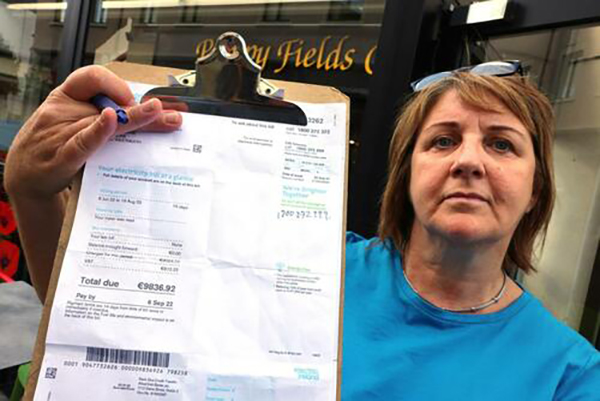Supply chain crisis threatens lucrative holiday sales of many companies
12/21/2021 / By Arsenio Toledo

The supply chain crisis is robbing many companies of potential lucrative holiday sales as they are unable to offer Christmas shoppers the products they want due to transportation delays, goods shortages and staffing problems.
America’s supply chain collapse has led to businesses having trouble sourcing everything from gaming consoles and other potential gifts to holiday decorations like Christmas trees. (Related: Supply chain crisis causes shortage in toys, spoils Christmas for millions of kids.)
Hot-sauce producer Eli Dicklich of Herbadashery LLC in Casper, Wyoming, said he does not have enough eight-ounce glass jars to bottle his sauces and ship them to customers. He has lost a lot of potential revenue due to this shortage in jars.
“I couldn’t fill new orders coming in,” said Dicklich. “I’m sure I missed out on a bunch.”
Kemi Tignor, owner of Little Likes Kids LLC, a Washington, D.C.-based company that creates puzzles for children, said the port congestion and delivery delays almost made her miss a major deadline for a retail customer’s delivery. Her company’s puzzles were stuck at a warehouse, waiting to be moved to another warehouse before it can finally reach her.
Tignor rented a U-Haul in late October and drove four hours to a warehouse in Monmouth Junction, New Jersey, where her company’s goods were stuck.
“I do not have any equipment to load the truck and I have no men with me,” wrote Tignor in an email to one of the warehouse’s employees. “Will your warehouse be able to load the U-Haul truck?”

With the help of warehouse employees, she got her products loaded onto the truck. Afterward, she drove an additional six hours to a logistics provider in Rhode Island that helped her ship the items to retail stores.
Jim Barber, a managing partner of MWB Toy Co. in Danbury, Connecticut, announced that the company had to cut off some of its wholesale business to focus on the many customers buying directly online. The influx of new orders caused a shortage in toy components that it sells under the Luke’s Toy Factory brand.
“All of a sudden we are out of firetruck ladders. This week we are out of dump truck gates,” said Barber. “Right now, everyone is working full tilt.”
Denise Bandl, owner of Adaptive Tech Solutions, an Oklahoma-based company that modifies and makes toys for disabled children, said the supply chain crisis has caused her company to experience severe shortages. She now regularly spends hours just looking for new suppliers and is working overtime to fulfill orders.
“We try the best we can to keep our shelves stocked,” said Bandl. “Right now, we have more holes than we ever had.”
Dicklich has accepted that a lot of their 2021 holiday sales are likely lost for good due to supply chain disruptions, including backlogs at ports and shortages in materials and components.
Barber said his company’s sales would be 50 percent higher if he had enough toy components to sell. While Bandl is optimistic that she can fulfill many of her orders, she doubts they will reach her customers before Christmas.
According to the Census Bureau, nearly 30 percent of sales at hobby, toy and game stores last year occurred in November and December, with the last month of the year being the highest sales month for appliance stores.
Consumers urged to shop local to get their Christmas gifts immediately
Because of the shortages, many retailers urged consumers to get a jump on their holiday shopping to ensure they will get the gifts they want to give.
According to Avery Hartmans, writing for Business Insider, if consumers were able to order their Christmas gifts in November, they will only get shipped as soon as “the September orders made it from the docks to warehouses and October orders made it ashore.”
Hartmans pointed out that some Halloween merchandise just arrived at American ports. This means a lot of Christmas goods are still far away in other parts of the global supply chain.
This only represents the orders that American consumers were able to purchase. According to Adobe Analytics, consumers ordering online in October received more than two billion messages saying their desired products were out-of-stock.
For consumers who waited too long to shop for their holiday purchases, retailers and other experts are urging consumers to shop at local brick and mortar stores so that they don’t have to deal with the shortages and delays that come with online shipping.
“Brick and mortar may be more attractive for consumers later in the season,” said Rod Sides, an executive at professional services company Deloitte and leader of its American retail and distribution practice. “Shoppers can leave with goods in hand, versus waiting on promised dates from shippers.”
Curbside pickup will also be an option for many last-minute shoppers. Stores say they have greater control over inventory in their stores and through curbside pickup than they do over online orders. This means customers who go for these options are less likely to encounter mistakes or delays in orders.
Listen to this episode of the “Health Ranger Report,” a podcast by Mike Adams, the Health Ranger, as he talks about how supply chain disruptions will only get worse in 2022 as the government threatens more Wuhan coronavirus (COVID-19) lockdowns.
Read more stories about the supply chain crisis that’s affecting American holidays at Collapse.news.
Sources include:
Submit a correction >>
Tagged Under:
Bubble, Christmas, Collapse, crisis, debt collapse, economy, gifts, holiday shopping, Holidays, labor shortage, market crash, products, risk, small businesses, staffing shortage, supply chain, supply shortage
This article may contain statements that reflect the opinion of the author
RECENT NEWS & ARTICLES
COPYRIGHT © 2017 COLLAPSE.NEWS
All content posted on this site is protected under Free Speech. Collapse.news is not responsible for content written by contributing authors. The information on this site is provided for educational and entertainment purposes only. It is not intended as a substitute for professional advice of any kind. Collapse.news assumes no responsibility for the use or misuse of this material. All trademarks, registered trademarks and service marks mentioned on this site are the property of their respective owners.





















